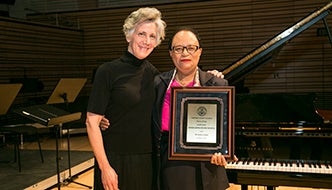
(l-r) Paul Jennings, general manager of Artist Pianos, and Steinway’s Sally Coveleskie presented the plaque to HASS Dean Mary Simoni and President Shirley Ann Jackson at the Holiday Concert at EMPAC in December.
For over 160 years, Steinway & Sons has been dedicated to making the finest pianos in the world, setting the “uncompromising standard for sound, touch, beauty, and investment value.” According to the organization, every Steinway & Sons grand and upright is a masterpiece of craftsmanship and consummate work of art. Now, Rensselaer joins more than 180 institutions on five continents designated as All-Steinway Schools, dedicated to providing the best instruments possible for the study of music.
An official All-Steinway plaque of recognition was presented to President Shirley Ann Jackson during the Institute’s annual holiday concert, titled Musica de Profundis, on Dec. 18, in the Curtis R. Priem Experimental Media and Performing Arts Center (EMPAC) Concert Hall. According to the organization, each Steinway piano, consisting of more than 12,000 individual parts, has its own musical character and is as unique as the individual who plays it.
In the last five years, Rensselaer has purchased five Steinway grand pianos and six Steinway-engineered studio pianos, and a Steinway grand was donated to Rensselaer by Philip Maloof ’58 in honor of his mother and her brothers.
“At Rensselaer, we work to ensure that our students and faculty are able to practice, to compose, and to perform on the very finest of instruments,” said President Jackson. “Our Steinway pianos exemplify the seriousness of our commitment at Rensselaer to the arts, and to the connection between the arts and science and technology. We thank Steinway & Sons for recognizing Rensselaer as a university that provides its students and faculty with the most advanced tools for education, for expression, for collaboration, and for innovation.”
President Jackson noted that such a commitment can be seen in the creation of the “magnificent performing arts center,” which also serves as a laboratory for research in human perception and immersive technologies of all kinds; in Art_X@Rensselaer, which is incorporating artistic concepts across the curriculum and throughout the campus; in the Arts faculty, including Rensselaer Orchestra director Nicholas DeMaison, and new assistant professors Nina Young and Robert Hamilton; and in the development of a new, technologically focused Bachelor of Science in Music degree, which will be launched once it has proceeded through the appropriate stages of approval.
“One of my goals when I came to Rensselaer was to expand upon the media, arts, science, and technology signature research thrust and, more recently, to develop programs around Art_X@Rensselaer, noting the Institute’s commitment to advancing knowledge and culture at the nexus of the arts writ large and the STEM disciplines,” said Mary Simoni, dean of the School of Humanities, Arts, and Social Sciences (HASS).
Our Steinway pianos exemplify the seriousness of our commitment at Rensselaer to the arts, and to the connection between the arts and science and technology.”—President Jackson
Since joining Rensselaer, Simoni has been investigating the existing Rensselaer music culture, supported by faculty with wide-ranging interests and expertise. The faculty include Associate Professor Curtis Bahn, Professor Michael Century, Associate Professor Tomie Hahn, Assistant Professor Robert Hamilton, Professor of Practice Eddie Ade Knowles, and Assistant Professor Nina Young.
“I am very pleased to announce that this year’s holiday concert marks an important milestone at Rensselaer—an opportunity for Steinway & Sons Pianos to publicly recognize HASS as an All-Steinway School,” Simoni said. “Steinway awards this designation to music educational institutions in which not less than 90 percent of the pianos, whether in performance venues, teaching studios, or practice rooms, are Steinway instruments, maintained in performance-quality condition by Steinway-certified technicians. With outstanding faculty, sophisticated performance spaces, the tireless work of our seasoned music faculty, and exciting new course offerings, our recognition from Steinway is testimony to our unwavering dedication to the pursuit of excellence in music.”
“Our organizations have much in common—both established in New York in the 19th century—and both dedicated to the marriage of technology and art,” said Steinway representative Sally Coveleskie, who attended the concert and presented the plaque to President Jackson. “Established in 1853—when Rensselaer was already 29 years old—Steinway & Sons began earning accolades for bringing technology and art together when we were awarded the first prize, the gold medal, at the Paris Exposition in 1867.”
Based in a factory in Long Island City, the same building where Steinway has been manufacturing since 1879, 300 pairs of human hands craft 12,000 individual parts into one voice creating instruments like the one heard during the concert at Rensselaer, Coveleskie noted. “But, the Steinway is silent until it finds its player, where both become partners in the creation of art,” she said.
“Steinway & Sons has touched so many lives in so many ways throughout history that one wonders what marvels the new Steinway pianos at RPI will have the power to inspire,” Coveleskie added. “Equipped with new Steinway and Steinway-designed pianos from the performance spaces to the teaching studios, to classrooms and practice rooms, RPI has provided instruments that will help the students become the best they can be. Current students and future generations will thank you both publicly and silently for the great gift that you have given to them, and for the legacy you have ensured.”


